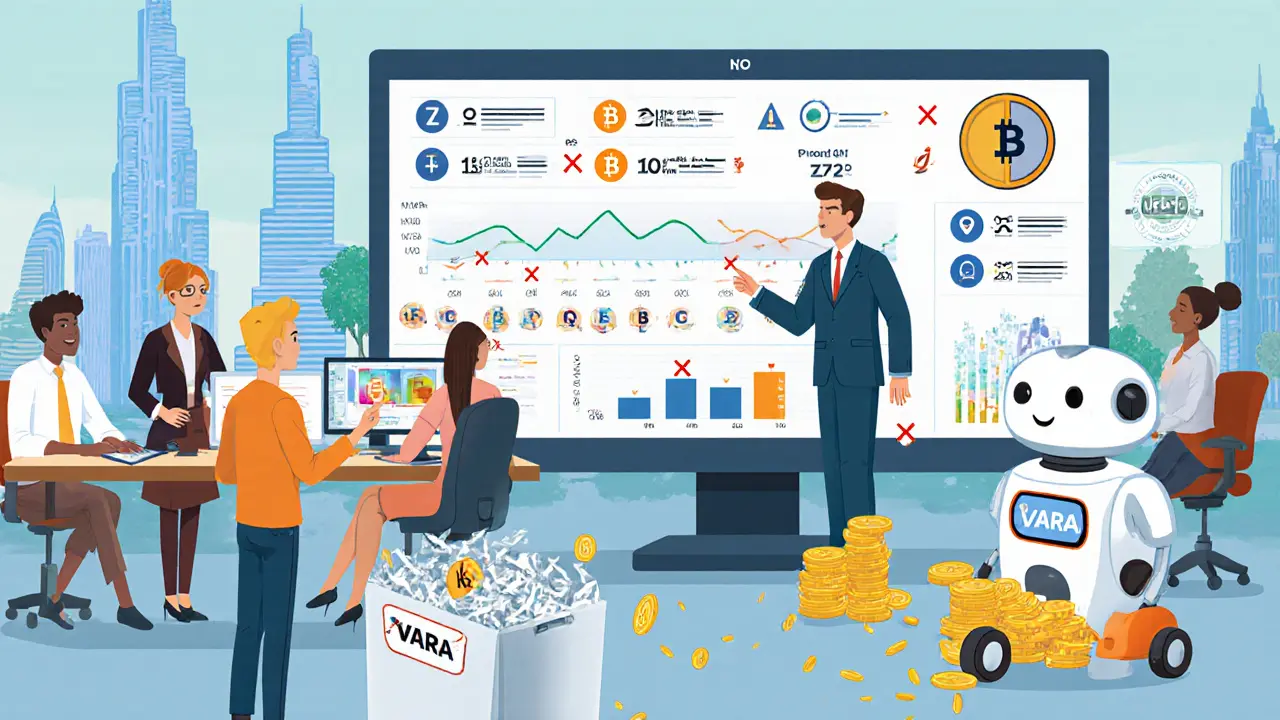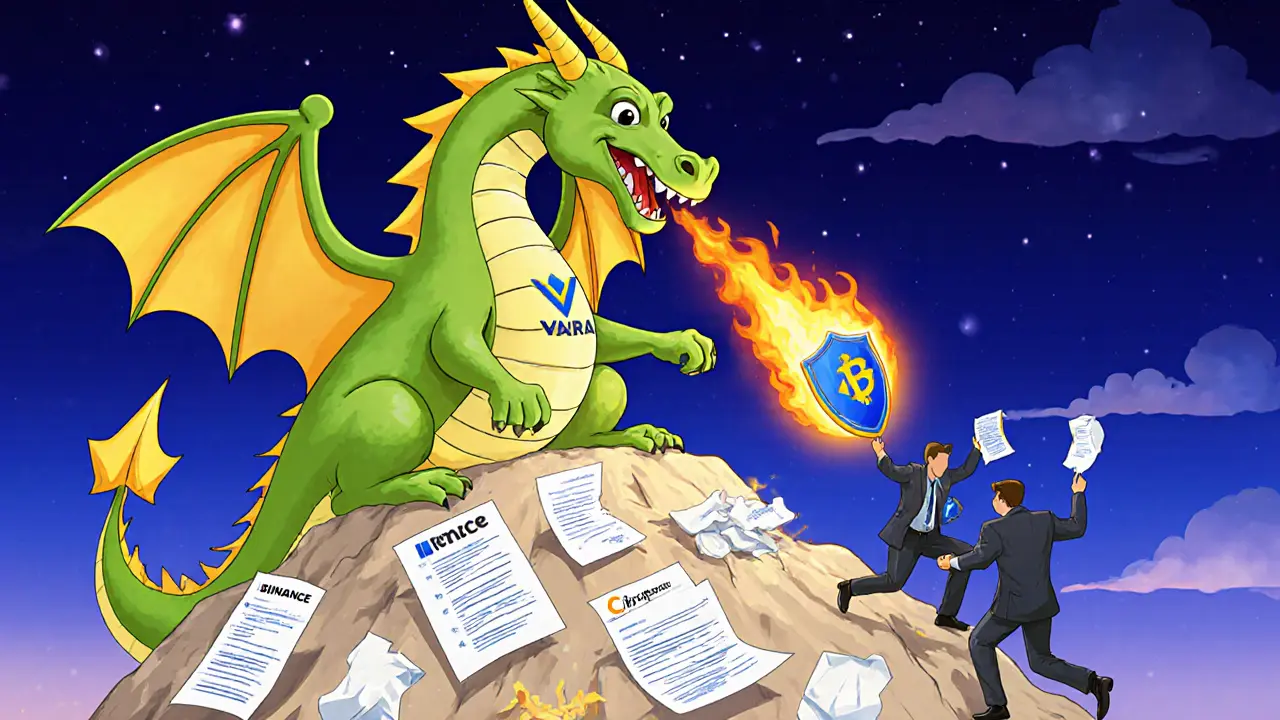 Nov, 21 2025
Nov, 21 2025
VARA Licensing Cost Calculator
License Type Selection
Cost Summary
Getting a crypto license in Dubai isn’t just about filling out forms. If you’re trying to launch a crypto exchange, custody service, or token issuance business in 2025, the Dubai Virtual Assets Regulatory Authority (VARA) is the only gateway you need to pass through - and it’s stricter than ever. Unlike other jurisdictions that offer quick approvals, VARA demands real infrastructure, real capital, and real compliance. This isn’t a paper license. It’s a full operational overhaul.
What VARA Actually Regulates (It’s More Than Just Exchanges)
VARA doesn’t just oversee Bitcoin and Ethereum trading platforms. Its 2025 rules cover every type of virtual asset activity outside the DIFC. That includes:
- Crypto exchanges (fiat-to-crypto and crypto-to-crypto)
- Custody services (cold storage, multi-sig wallets, institutional vaults)
- Token issuance (STOs, utility tokens, NFTs)
- Wallet providers (non-custodial and custodial)
- Broker-dealers and transfer services
Even DeFi protocols are now in scope. If your smart contract interacts with users in Dubai - even if you’re based in Singapore - VARA can require you to get licensed. There’s no loophole. The authority tracks on-chain activity and can identify entities serving Dubai-based users.
How Much Does It Cost to Get Licensed?
The numbers are not small. VARA’s 2025 licensing fees and capital requirements are among the highest in the world. You’re not just paying for paperwork - you’re paying for operational readiness.
Here’s what you’ll need to budget for:
| License Type | Minimum Paid-Up Capital | Application Fee | Annual Supervision Fee |
|---|---|---|---|
| Exchange Services | AED 5 million ($1.36M) | AED 100,000 ($27,200) | AED 200,000 ($54,400) |
| Custody Services | AED 4 million ($1.09M) | AED 80,000 ($21,800) | AED 150,000 ($40,800) |
| Broker-Dealer | AED 1 million ($272,000) | AED 60,000 ($16,300) | AED 100,000 ($27,200) |
| Wallet Provision | AED 1.5 million ($408,000) | AED 50,000 ($13,600) | AED 120,000 ($32,600) |
| Token Issuance | AED 100,000 ($27,200) | AED 40,000 ($10,900) | AED 80,000 ($21,800) |
If you want to run a full-service crypto firm - exchange + custody + broker - you’re looking at a minimum of AED 10 million ($2.72M) in capital alone. That’s not optional. VARA checks bank statements and requires proof of funds before even reviewing your application.
What Happens If You Skip the License?
Operating without a VARA license in Dubai is not just risky - it’s illegal. The authority has enforcement teams that monitor social media, Telegram channels, and blockchain activity. They track IP addresses, wallet interactions, and local user sign-ups.
Penalties include:
- Fines up to AED 5 million ($1.36M)
- Immediate shutdown of local operations
- Blacklisting from future licensing applications
- Criminal liability for directors and compliance officers
In 2024, VARA shut down three unlicensed DeFi platforms that were actively marketing to Dubai residents. One founder was barred from entering the UAE for five years. This isn’t a warning. It’s a policy.
The Ban on Privacy Coins (Monero, Zcash, and Others)
VARA doesn’t just regulate - it restricts. In late 2023, the authority issued Administrative Order 2023/2024, banning all privacy-enhancing tokens. That means:
- Monero (XMR)
- Zcash (ZEC)
- Horizen (ZEN)
- Any coin with built-in obfuscation features
These tokens are outright prohibited on all VARA-licensed platforms. Even if you’re a user in Dubai, you can’t hold or trade them on a licensed exchange. VARA’s reasoning is simple: privacy coins make AML/CFT compliance impossible. There’s no negotiation. If your token has ring signatures, zk-SNARKs, or stealth addresses - it’s banned.

Marketing Rules: No More Influencer Promises
Before 2025, crypto ads in Dubai were wild. Now, every single marketing piece - Instagram post, YouTube video, TikTok ad, or influencer campaign - needs prior VARA approval. The authority reviews every word, every graphic, every promise.
Here’s what’s banned:
- Guaranteed returns or profit claims
- Use of phrases like “risk-free,” “10x returns,” or “next Bitcoin”
- Celebrity endorsements without full disclosure
- False claims about regulatory approval
One company lost its license in March 2025 after running a campaign that said “Earn 15% monthly with our staking pool.” VARA didn’t just fine them - they revoked the license and banned the CEO from reapplying for ten years.
Token Classification: Three Tiers, One Rule
Not all tokens are treated the same. VARA’s 2025 token categorization system splits them into three buckets:
- Category 1: Asset-backed tokens and stablecoins - Must be fully licensed. This includes tokenized gold, real estate, or USD-pegged coins like USDT and USDC if issued in Dubai.
- Category 2: Utility tokens - Only need a licensed distributor. Think gaming tokens or platform access keys. The issuer doesn’t need a VARA license, but the entity selling them does.
- Exempt categories - Loyalty points, in-game credits, and non-transferable digital items. These don’t need approval but must still comply with consumer protection rules.
If you’re launching a new token, VARA requires a detailed whitepaper with tokenomics, use case, and legal structure. No vague “we’re building the future” statements. They want financial models, distribution schedules, and legal disclaimers.
The Real Barrier: Compliance Culture, Not Paperwork
Most companies fail not because of the fees - but because they think compliance is a checklist. VARA doesn’t care if you have a policy document. They care if your team lives by it.
Successful applicants have:
- A dedicated Chief Compliance Officer (CLO) based in Dubai
- Internal audit logs reviewed monthly
- Real-time transaction monitoring systems
- Employee training records for AML/KYC
- External auditors with VARA-approved credentials
One firm spent 11 months preparing. They hired a former DFSA regulator as their CLO, built a custom compliance dashboard, and ran three internal mock audits. They got approved in 3 weeks. Another firm submitted the same documents but skipped the training. They got rejected - and had to reapply after six months.

VARA vs. DFSA vs. FSRA: Who Do You Need?
Dubai has three regulators. You only need one - but choosing the wrong one costs you time and money.
- VARA: Covers the entire Dubai mainland and free zones. This is where 90% of crypto startups go.
- DFSA: Only operates inside the Dubai International Financial Centre (DIFC). It’s for institutional investors, hedge funds, and banks. Higher capital, slower process, more international recognition.
- FSRA: Covers Abu Dhabi Global Market (ADGM). Similar to DFSA but smaller. Less crypto activity, more traditional finance.
If you’re a crypto exchange or wallet provider, VARA is your only realistic option. DFSA and FSRA don’t want retail-focused businesses. They want institutional players with billions in assets under management.
Who’s Already Licensed? (Real Names, Real Companies)
VARA doesn’t just issue licenses - it attracts giants. As of November 2025, over 120 firms are licensed. Here are some names you know:
- Crypto.com
- Binance
- OKX
- Bybit
- Bitget
- Gate.io
- BitMart
These aren’t shell companies. They’ve all set up local offices, hired compliance staff, and integrated VARA’s reporting systems. If they can do it, you can too - if you’re ready to invest properly.
What’s Next? DAOs, DeFi, and the Future
VARA is already working on new rules for decentralized autonomous organizations (DAOs). In 2026, you’ll likely need a special license to operate a DAO that accepts Dubai-based members or holds assets on-chain.
DeFi protocols will face mandatory KYC on-ramps. If your protocol lets users connect wallets from Dubai, you’ll need to verify their identity - even if you’re built on Ethereum.
VARA is also pushing for cross-border recognition. Talks are underway with Singapore, Switzerland, and the EU to accept VARA licenses as equivalent. That means your Dubai license could soon open doors in other major markets.
Can I get a VARA license without a physical office in Dubai?
No. You must have a legal entity registered in Dubai mainland or a designated free zone (like DIFC, DMCC, or RAKEZ). VARA only licenses incorporated businesses. Foreign companies can own 100% of their Dubai entity, but the company must be locally registered.
How long does the VARA licensing process take?
It takes 3 to 12 months, depending on preparation. Companies with full documentation, experienced compliance teams, and clean audit histories can get approved in 3-4 months. Those submitting incomplete applications or lacking internal controls often face delays of 6-12 months due to back-and-forth requests.
Are NFTs regulated by VARA?
Yes. If you’re creating, selling, or trading NFTs that represent ownership rights, access, or financial value, you need a VARA license. Simple in-game skins or loyalty points are exempt. But NFTs tied to real estate, art, or revenue-sharing are classified as asset-backed tokens and require full licensing.
Can I use a third-party compliance provider to handle VARA requirements?
You can outsource some tasks, like AML screening or audit preparation, but VARA requires you to have a full-time Chief Compliance Officer based in Dubai. You can’t outsource accountability. The license is issued to your company, not your service provider.
Do I need insurance to get a VARA license?
Yes. All licensed VASPs must carry professional liability and cyber insurance with minimum coverage of AED 10 million ($2.72M). The policy must name VARA as an additional insured party. Policies from international insurers are accepted if they meet VARA’s standards.